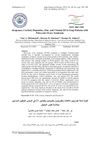 July 2022 in “Research Square (Research Square)”
July 2022 in “Research Square (Research Square)” A new gel helps grow mature eggs in a lab that can be fertilized and develop further.
 1 citations,
May 2023 in “European Journal of Human Genetics”
1 citations,
May 2023 in “European Journal of Human Genetics” Rare ULBP3 gene changes may raise the risk of Alopecia areata, a certain FAS gene deletion could cause a dysfunctional protein in an immune disorder, and having one copy of a specific genetic deletion is okay, but two copies cause sickle cell disease.
 69 citations,
September 2006 in “Human Reproduction”
69 citations,
September 2006 in “Human Reproduction” Women with PCOS have fewer activated T cells in their ovarian follicles, which might affect fertility.
 90 citations,
January 2021 in “Clinical Endocrinology”
90 citations,
January 2021 in “Clinical Endocrinology” Obesity increases the risk of developing polycystic ovary syndrome, and weight loss can improve the condition.
 April 2024 in “Frontiers in endocrinology (Lausanne)”
April 2024 in “Frontiers in endocrinology (Lausanne)” Melatonin improved secondary hair growth in goats but didn't affect primary hair density or litter size.
 12 citations,
January 2021 in “International Journal of Biological Sciences”
12 citations,
January 2021 in “International Journal of Biological Sciences” Scientists successfully edited a goat's genes to grow more and longer cashmere hair.
 3 citations,
May 2023 in “Biomedicines”
3 citations,
May 2023 in “Biomedicines” PCOS causes infertility mainly due to hormonal imbalances, insulin resistance, and chronic inflammation.
Genetic analysis of rabbits identified key genes for traits like coat color, body size, and fertility.
 February 2025 in “Iraqi Journal of Science”
February 2025 in “Iraqi Journal of Science” PCOS patients have higher LDH and lower cortisol, dopamine, zinc, and vitamin D3, which may contribute to their symptoms and obesity.
 October 2023 in “Frontiers in endocrinology”
October 2023 in “Frontiers in endocrinology” Effective PCOS treatments require targeting specific signaling pathways.
 2 citations,
May 2010 in “Journal of Obstetrics and Gynaecology Canada”
2 citations,
May 2010 in “Journal of Obstetrics and Gynaecology Canada” PCOS is a complex condition linked to hormonal imbalance and insulin resistance, with weight loss being important for management.
 6 citations,
December 2022 in “Frontiers in Pharmacology”
6 citations,
December 2022 in “Frontiers in Pharmacology” Quercetin may help improve symptoms of polycystic ovary syndrome.
 467 citations,
October 2014 in “European Journal of Endocrinology”
467 citations,
October 2014 in “European Journal of Endocrinology” The European Society of Endocrinology advises individualized long-term management for PCOS, focusing on lifestyle changes, accurate diagnosis, and treatments for associated health risks and symptoms.
 January 2025 in “Cosmetics”
January 2025 in “Cosmetics” Astragalus sinicus extracts may help promote hair growth and treat hair loss.
 1 citations,
January 2022 in “IntechOpen eBooks”
1 citations,
January 2022 in “IntechOpen eBooks” Different PCOS types respond uniquely to infertility treatments, with some having lower pregnancy rates and higher risks of complications.
 4 citations,
October 2022 in “Evidence-based complementary and alternative medicine”
4 citations,
October 2022 in “Evidence-based complementary and alternative medicine” Ficus carica extract improved fertility in rats and may help with certain health conditions.
 62 citations,
August 2018 in “Frontiers in Endocrinology”
62 citations,
August 2018 in “Frontiers in Endocrinology” Androgens are important for normal ovarian function and estrogen production, but may not be the main cause of follicle death.
 195 citations,
November 2019 in “Clinica Chimica Acta”
195 citations,
November 2019 in “Clinica Chimica Acta” High levels of male hormones, insulin resistance, and obesity are closely linked and worsen polycystic ovary syndrome, but more research is needed to improve treatments.
 58 citations,
March 2013 in “Human Reproduction Update”
58 citations,
March 2013 in “Human Reproduction Update” Products should be called 'sperm-safe' only after thorough, well-designed tests.
 54 citations,
November 2017 in “Scientific Reports”
54 citations,
November 2017 in “Scientific Reports” The study found that certain microRNAs are higher in the cells and lower in the fluid of women with a specific type of polycystic ovary syndrome, and one microRNA could potentially help diagnose the condition.
 1 citations,
July 2021 in “Current Issues in Molecular Biology”
1 citations,
July 2021 in “Current Issues in Molecular Biology” Father's finasteride use may affect son's fertility and testicular function.
 July 2023 in “International Journal of Endocrinology”
July 2023 in “International Journal of Endocrinology” Centratherum anthelminticum seed extract effectively treats Polycystic Ovary Syndrome in rats.
 55 citations,
May 2019 in “Journal of Endocrinology”
55 citations,
May 2019 in “Journal of Endocrinology” Androgens are important for female fertility and could help in IVF treatment, but also play a role in causing PCOS.
 506 citations,
January 2012 in “Molecular and Cellular Endocrinology”
506 citations,
January 2012 in “Molecular and Cellular Endocrinology” Melatonin affects many body functions beyond sleep by interacting with specific receptors in various tissues.
 1 citations,
October 2017 in “Elsevier eBooks”
1 citations,
October 2017 in “Elsevier eBooks” Antiandrogens can treat female hormonal conditions, but environmental ones may harm reproductive health.
6 citations,
September 2023 in “International journal of molecular sciences” Oxidative stress worsens PCOS by damaging cells and disrupting metabolism, suggesting antioxidant treatments might help.
 May 2023 in “Journal of Student Research”
May 2023 in “Journal of Student Research” Creating specific biological indicators is important for early detection and treatment of PCOS.
 200 citations,
October 2009 in “European journal of endocrinology”
200 citations,
October 2009 in “European journal of endocrinology” Metformin helps manage polycystic ovary syndrome by improving insulin resistance and ovulation, but more research is needed on its full effects.
 50 citations,
January 2016 in “The Journal of Clinical Endocrinology and Metabolism”
50 citations,
January 2016 in “The Journal of Clinical Endocrinology and Metabolism” Certain microRNAs in the fluid around eggs are linked to Polycystic Ovary Syndrome and may help diagnose it.
 28 citations,
September 2017 in “Gynecological Endocrinology”
28 citations,
September 2017 in “Gynecological Endocrinology” Women with PCOS have higher levels of AMH in their blood and follicles, and this can help predict their risk of overreaction to fertility treatments.




























